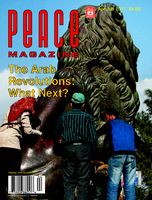
Peace Magazine Apr-Jun 2011, page 4. Some rights reserved.
Search for other articles by Metta Spencer here
The year 2011 is changing the course of history. The democratization that began in Tunisia has spread throughout the Middle East, requiring reversals of foreign, military, and economic relations among all the world’s states. While that crisis mounted, the earthquake, tsunami,and nuclear meltdowns took place in Japan, killing thousands, jeopardizing the survivors’ health and well-being, and changing the odds for the use of nuclear energy as an approach to limiting global climate change.
Prepare for surprises. The Arab rebellions were about to raise the price of oil—an outcome to be celebrated for its restraint of climate change, if not for its economic effects.Then the earth shook the land and sea, wrecking the Japanese economy and reducing oil prices. And a day later the nuclear reactors failed, now increasing demand, and hence also the price, of oil.
We at Peace Magazine worried all along about the contagious Maghreb protests. While the pro-democracy activists in Tunisia and especially in Egypt had trained and strategized for up to two years before launching their nonviolent resistance movement, their counterparts in other Arab countries, especially Libya, lacked any preparation, but took to the streets in a spontaneous, imitative uprising. Yet research by Maria Stephan and Erica Chenoweth has shown that “major nonviolent campaigns have achieved success 53 percent of the time, compared with 26 percent for violent resistance campaigns.” And if nonviolence fails, it is usually because of inadequate planning. Nonviolent strategists absolutely must first identify the society’s “pillars of power” and neutralize them, for otherwise the regime’s military will not defect but will kill them. Please pass the message on: Contagious enthusiasm is not enough. Strategize!
As we go to press, even peace workers are debating whether to aid the Libyan rebels with a no-fly-zone. We cannot be sure that these rash, unprepared youths can create the democracy they want, even if they win, but in this situation a no-fly-zone may actually be the lesser evil, compared to letting Gadhafi go on murdering his people. If so, the military should not be directed by the US this time. We wish the Libyan youths—for their own sake—had used nonviolence, but what Gadaffi is doing is unconscionable.
There are few clear lessons in these events for our politicians, but perhaps we can suggest this one: You’d better stop running international affairs entirely on the basis of pragmatic national interests without regard to principles. If you keep that up, every new generation of idealists is going to make you ashamed of your own craven ways! We are all our brothers’ keepers. The question is, how we can do so in the most peaceable way?

Peace Magazine Apr-Jun 2011, page 4. Some rights reserved.
Search for other articles by Metta Spencer here